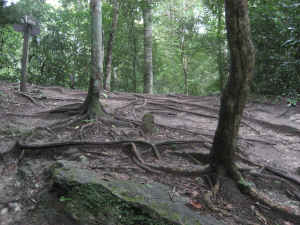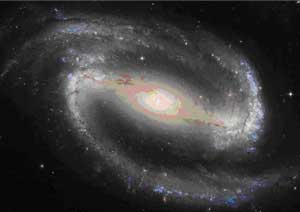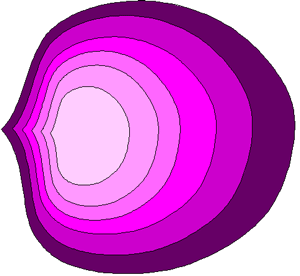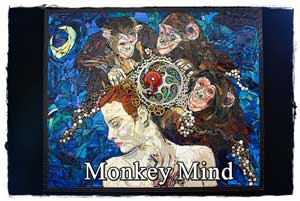Role Of The Unconscious - "The Yet To Be Revealed"
Did you ever walk into a room and forget why you went in there? What if life was like that?Jim Euclid


Being Conscious (Explicit) & Unconscious (Implicit) An aspect of working together in the therapy process is to shed light upon what it's like to be us, including our unconscious patterns (e.g. of thinking, feeling, behaving), so they are conscious, exploring not just the thinking brain but the noticing brain. The unconscious aspects of us are more than our blind spots and includes the things we keep at the back of our mind and beyond that we are not in touch with, don't yet know (see also The Realm of the Unconscious). Our past and future potential live there. We can't know what we don't know and throughout life we shift states between being connected with ourself - conscious, and then not connected - unconscious, what lay beneath the surface (the roots of a tree may be much longer, deeper than the visible tree). Much of what we do is from implicit unconscious processes. Things inside of us can be outside of our access, as if happening under our radar. Our unconscious points us towards things (see also Living To Our Full Potential). Counselling and psychotherapy can help to make sense of what might be unconscious in us (including our backstory), so we make connections. Being either conscious or unconscious is not binary - consciousness flows back and forth between both. Some people experience consciousness like flipping a switch - from feeling cut off to being connected - alive, whereas others experience a more gradual process of being less on "auto-pilot" or in a dream-like state. Consciousness is as if we are aware of being ourself - who we are beyond personality, catching ourself with what we are doing and experiencing in some moments (including thinking, feeling, behaving), yet other times not, as if we are not fully awake, living on automatic. Consciousness can be viewed as our deep capacity to respond to stimulation. We tend to be more conscious of ourself (our explicit processes) and the world around us, when we make time to reflect and in times of change, at a turning point, or when we need to make important choices. Through crisis or when we, or a loved one, are seriously ill, or someone has died, can also be experienced as a wake-up call to consciousness - where we can sense our own existence (see also Reflective, Existential Concerns), separateness, preciousness of life and consciousness. Also, when we are left behind, singled out or feel in a minority, this too can trigger our sense of consciousness. Accompanying ourselves - noticing what we are noticing (as if looking on at ourself), we may want to explore comfortable ways to consciously live throughout our life's journey (or what some people call soul - consciousness). And it is our consciousness, which can be interpreted as our mind, awareness (see also Contemplation, Creating Space & Quiet Time, Taking Pauses - Self-Awareness, Observation & Self-Reflection, Including Journalling, Studying), soul that are agents towards healing. (Some of us, maybe through meditation, may become aware that we - our Self - are not the body, that we exist outside of the body as consciousness.)
You cannot solve a problem from the same consciousness that created it. You must learn to see the world anew.Albert Einstein
What Consciousness Do We Reside In? It could be said that there are two levels of consciousness - our ego/wounded self or our true self essence.

Stream Of Consciousness When we wake up in the morning on the edge of consciousness (between the unconscious and conscious), it is as if our mind ignites as layers of consciousness gradually unfold and we begin to internally talk to ourselves. For some, as we awaken, so too may our anxiety. We may have recognised last night's dream, or quickly turn to reflecting on yesterday's events or today's plans (see also Present, Past & Future). We experience certain likes and dislikes, moods, emotions, and thoughts, etc. This process happens throughout the day, some experiences and meanings we are in touch with and others not. This can affect our sense of the oceans of time and infinite space and space itself can be viewed as consciousness. (Margaret Hockney says space is God.) We all have fluctuating levels of unfolding consciousness, no matter what our intelligence, and sometimes it can seem as if we are witnessing this - see Bridge Between The Unconscious (Unknown) & Conscious (Known). Others may feel they have to share all their conscious thoughts, feelings, to others and end up over-talking.

Consciousness Follows Experience Experience comes from engaging with life. As if sleepwalking a little (see also Inner Fog, Drifting), some of us may not quite know how we got here. Through our actions (volition - acting in order to know) we have an experience, which creates more consciousness. These experiences offer us an opportunity to reflect with a potential for learning. This inner reflection can highlight aspects of us that now need paying attention to, which we have previously ignored (or were unconscious to). The therapy works with our unfolding consciousness and how this feeds our understanding.
Unconscious Reactions Often when we are in fast reaction ("I found myself..."), we may not be conscious of our intentions, rationalities, or struggle to think straight, as if on autopilot (see Source Of Our Motivation). As we slow things down and reflect (see also Mentalising) it may become clearer to us that there was a part of us inside, which was unintentionally in reaction, maybe previously unconscious. Our unconscious pulls, reactions or action may also have an impulsive or compulsive element. Counselling and psychotherapy can help us with our awareness, observations and reflections about our emotions, thoughts, behaviour patterns (including any ways we sabotage things) actions, body (physical sensations) and disidentification, so we take back control, choose how we think, feel, respond, taking responsibility for our effect. (See also Mindfulness)
Self-Reflective Much of our inner world is unconscious. Most of us can recall moments of being on the outside - looking in, saying something like "I found myself thinking ........." or "I was watching it happen". We all have reflective moments - maybe through long distance travel or even in the bath, or on the park bench - listening and connecting to ourself (see also Being & Doing - Dilemmas We May Hold), whereas other times we are out of touch with ourself. This observing part of ourselves, who watches over us - as we catch ourself, can be experienced as being more conscious than the part of us that is unable to reflect, or realise what we are in touch with. The therapy can help enable us to become more in touch, conscious of ourself, those around us and the wider world. (See also Self-Reflection - Looking Inside & Reflecting Upon What We Find)
We think more than we think we think.
Early Unconscious Agreements, Beliefs When younger many of us made unconscious agreements and beliefs with ourselves, formed an internal working model about how we saw ourselves, who we believed we are, how our life should be, how others should treat us, our values (when very young we also learn to mould aspects of us around what we fear is unacceptable, bad and these can get cast into our unconscious shadow and become acted out in distorted ways (sometimes watching ourself do things as if we are repeating a compulsion and can't stop - see also Self-Sabotage, Destruction) through anger, depression, anxiety, addiction, etc) as if following some sort of life script (see also Trauma). We may have made vows, promises to ourselves, when we get older - some of them unconscious. This may affect our reasoning and the weight we put on to things. The counselling and psychotherapy can be a space to explore now the impact and validity of these early unconscious self-beliefs, loyalties, oaths, sacred cows.

Evolving Consciousness - Benefit Of Hindsight The benefit of hindsight can help us, yet hindsight can also be a curse if we blame ourself, lack forgiveness, hold on to regrets (see also Our Personal Narratives, Scripts, Remembering - Old Emotions, Current Emotions). As our consciousness evolves and in our humanity, we can meet our shadow side with honesty, our wounds with compassion, our differences with curiosity. Our consciousness evolves, for example, looking back on our childhood we later become aware of how we often unwittingly, unconsciously reacted. Back then we weren't as wise as we are now (see also Bridge Between The Unconscious (Unknown) & Conscious (Known)). As our consciousness evolves, this may also mean learning to take care of our wounded self. When we were younger, the child in us was not conscious (for we could only know what was in front of us at the time), and although we are more conscious now, the child inside us may remain largely unconscious (see also Our First Relationship - Early Connections & Bonding Patterns). What was undiscovered becomes uncovered through our conscious and unconscious curiosity and sometimes through dreams. At times we live as adults through our unconscious child, who can't fully remember their past, yet repeats it in adulthood (often experiences, which we were unable to integrate and didn't seem to make sense back then). Like evolving wisdom this process of knowing (consciousness) and not knowing (the unconscious), does not stop when we reach adulthood. We have all slipped into ways of behaving. It's only after the benefit of hindsight and reflection that we realise that we could have chosen a different path. We can be wiser after the event looking back at situations, experiences, reactions, seeing them differently now, which for some may bring up regrets, existential concerns, existential grief. This new wisdom, learning may be about our evolving consciousness. For example parents only learn how to be parents, by being parents, and they are much wiser (conscious) after the event (see also The Impact Of Our Past Affecting Us Now, Including Our Relationships).
Every saint has a past, and every sinner has a future.Oscar Wilde

Evolving Consciousness - The Meanings We Make When we are conscious, we try to make sense of and organise things. We are always conscious of something, maybe relationship with the world and others, our shared humanity - our shared similarities, differences, all of which may be evolving, as may connecting to the strengths of our relationships with others. We have the potential to evolve as a more conscious human being, yet at the same time remembering what has always lived within us (as Eliot once wrote, "In my end is my beginning".) As we become more conscious of how we have been seeing the world and ourself, this consciousness evolves and entails a level of suffering. And when we honour and value our sensitivity, are present to ourself, rather than being distracted and kind rather than being reactive, sometimes choosing truth over comfort we may be able to listen to our inner guidance, live in alignment with what feels deeply right. It is as if the lenses, through which we experience and see things, opens up. Some people report evolving consciousness as knowing a little more about ourself today than we did yesterday, as our continuous interactions with everything that happens around us creates continuous learning, multiple meanings. Some of these meanings we create consciously, and others unconsciously, yet both influence our actions. As we (or our psyche) become more conscious, we may question consciousness in and beyond us, what's important to us and our priorities may change. For some we may link personal and collective consciousness with noticing our energy (and of others), nature, spirituality - what Roberto Assagioli names as the spiritual consciousness of the awakening, unfolding self (see also Life's Journey, Initiations - Connecting To Our Own Inner Journey, Direction & Creating Our Own Destiny) Self. The psychotherapy considers how we think and feel, what matters to us, the conscious (known) and unconscious (unknown, yet to be known) parts of ourself. (See also Ambition & How We Want To Evolve As A Person)
The contents of the mental stream are not as important as the consciousness that knows them.Mark Epstein

What We Ignore In Us We all tend to overlook or ignore our different roles, identities - maybe our sense of our body, certain feelings or emotions, some of our thoughts and creative imagination, love, our bits of "madness", our light and dark side, shadow, dark nights of the soul and some of these may be unconscious - repressed (other feelings may be conscious - suppressed). The integrative therapy may take into consideration how in touch and energised we are in our physical feelings, how we notice and utilise our mind, how we experience and express our range of feelings (see also Suffering & Love), as well as aspects of our sexuality and sense of the spiritual - whatever this means to us our ethical consciousness towards becoming a moral human being.

The Realm of the Unconscious We can experience unconscious memories, thoughts, beliefs, behaviours, expectations, primary and secondary feelings, without being consciously aware of them, and unconsciously project them onto others. The way we see the world - our perceptions, choices, habits and addictions, are limited to our consciousness, as it flows in and out. Most of what we do is not controlled by our conscious mind. The depths of the unconscious (including past experiences) stir inside of us affecting our present feelings, thoughts, behaviours. We all send and receive unconscious messages to ourself, most of which we are not fully aware of. Many mysteries of awareness are beyond our understanding. Sometimes we can experience thoughts or a spark of inspiration, as if they have come from nowhere, out of the left field. We can sometimes sabotage things, yet not fully know why we do this, which may come from our unconscious. We therefore unconsciously give out messages and stimulus to others (as they do to us), which influences our thinking, and in turn affects our beliefs, feelings, actions. Advertisers, with their subliminal messages, know this unconscious programming (and coded forms), evocative words, images, inferences well. Certain people and events from our past, whether traumatic or otherwise (e.g. a certain look, mannerism, tone, voice, even a so called "throw away" remark), can shape our responses and unconscious hooks, triggers, buttons (including in our relationships), which become pathways, condensing our history in the present. We may for example become over-stimulated or fearful more than we need to be by an event now because it reminds us of a painful or traumatic event in the past. So acting in a fear-driven way, may entirely be appropriate as a survival strategy, because we have yet to find different ways of responding. As we become more self aware, present, we can consciously change our previously unrecognised responses, allowing for spontaneity, surprises, responding less automatically, in pre-programmed ways. We can be more alive, open, "in the moment", relinquishing what we've known (See also Releasing Ourselves & Letting Go). Some people report this experience of becoming more conscious as a gradual awakening, a sense of their own "presence", "presence" of others and the wider world.
To be awake is to be alive.Henry David Thoreau

Listening To The Evolving Unconscious We may have reached a stage in our life, where problems, underlying symptoms we have ignored now need attention. (Sometimes it is as if we get reminders in life and need to work out what it is we need to learn.) Our unconscious can be viewed as an ally, pointing towards what we might need to pay attention, which may also support our insights. Often deep down, we know the real underlying concerns we need to address (maybe taking the longer way home for a change), yet sometimes we are not aware, as if they are buried somehow in our unconscious, until they unravel and reveal themselves over time, or during the process of therapy. Some of the issues in our life may be familiar to us and have lifelong patterns (often going back generations through family stories, setups), as if their messages carry echoes from our past, reverberating into our future, carrying a story (see also Free Will & Relationship To Fatalism, Preordainment, Determinism, Indeterminism & Randomness, Karma, Nature & Nurture - Dilemmas, Challenges). Acknowledging the pulls - from our past, pushes - pointing towards our future and potential the forces of the unconscious will be expressed in the therapy and the counselling and psychotherapy is a space to listen to and wonder what also might be communicated underneath our surface concerns, what else may be emerging for us and this can be discovered together in the therapy process.
Life speaks to us in each moment and as we listen, take note we can act on this.
Conscious & Unconscious Attitudes, Intentions, Expectations We all have conscious intentions, attitudes and unconscious attitudes, intentions - doing things yet being unsure why, which we also bring along to the therapy. (For example we may not be fully in touch with certain feelings or motivations, e.g. envy or jealousy, so we become rivalrous with someone without knowing why. Unconscious shame may play a role for some. Stemming from our past, we may always try to fix things or please others.) In relationships we have certain expectations, or may project these onto our partner alongside our thoughts, feelings, desires, intentions, etc. And we may sometimes communicate these unconsciously.
Source Of Our Motivation Some of us may procrastinate, struggling to mobilise our resources, which may be linked to our unconscious will. As we have experiences and the world impacts upon us - we may unconsciously respond back, reacting (sometimes it is as if we are acting from a script - a play not of our own making), and our will is unconscious. Our unconscious influences our motivation. Many choices, decisions we make are often not conscious ones (unconscious will) so we evolve unconsciously. We may for example have a sense of missing out on things. What we end up doing is affected by our conscious and unconscious influences (e.g. our unconscious will to remain the same, maybe stronger than our conscious desire to change). Our unconscious choices, intentions, drives, desires, hopes, beliefs, thoughts, feelings, behaviours, reactions, "saboteur", past, etc affect our actions. These influences, and unconscious pulls, may have a different agenda (to what we consciously want) with unintentional consequences, affecting whether we change. Therefore our conscious wishes may have one face value, yet mask our unconscious desires. As we act, not caught in reaction, our will is more conscious, as we become aware of what drives us. In order to bring about change - if that is our desire, counselling and psychotherapy also attempts to understand what lies behind our current difficulties, paying attention to our personal will or resolve (source of motivation) - in both its conscious and unconscious form. When these unconscious motivational forces (our will) are evoked and are at work, we react, re-enact in unaware ways, almost blindly and the therapy can explore this. Some people describe the will as the opposite to inertia. (See also Counselling For Motivation & Will Power)

Impact Of The Unconscious The formless unconscious has no sense of time, it is more of a space. In this infinite space (consciousness) it can be as if previous experiences and related feelings can be experienced and brought into the present time. Our dreams and imagination may also have a different realm of time, pointing to what might be emerging, transforming for us, including a consciousness of our relationship to our present, past, future. Losing our sense of time, because we are so engrossed or engaged in an activity, waking up in the morning and drifting off to sleep at night are experiences of movements of consciousness, concepts of time. Most of us have moments of reflection - being in touch with what's important or may be emerging in our life. We may for example be travelling, watching clouds float by, looking out to sea, as of we are noticing or searching for something larger than us, which for some allows us to be more in touch with the unconscious (see also Consciousness In & Beyond Us). Our literal, concrete world can be temporarily suspended for our imaginative world, until we turn back to the land again. How we integrate and respond to all our experiences may lead us to further enquiry, and for some - spiritual enquiry. Our unconscious influences us when we are both asleep (e.g. dreaming) and awake (e.g. our imagination, daydreaming). Our daydreams can be a rich resource for us, yet we may also want to let go of our daydreams in order to be grounded and connect to our source of motivation, utilise our creative imagination. Some aspects or parts of ourseIf go unnoticed, and take time to percolate into our consciousness. Psychotherapy can provide a space to shed light on your unconscious thoughts, processes, subliminal messages, which influence your actions.
What is now proved was once only imagined.William Blake
Unconscious From The Past & Pointing Towards Our Future We may often experience or carry implicit emotional memories stored in our body from our past and the therapy can consider the impact of these alongside also what may be unconsciously unfolding for us, pointing towards our life meaning, purpose and potential.

Interpreting Dreams - Meaning Of Dreams Our dreams, images can be so real at times and when we wake up, less so. Dreams come from our internal world. They are never harmful and seen as the rest of the important pieces of our life story, a path for the unconscious to come more into form by being revealed into our conscious mind for the purpose of becoming aware of something, possible transformation or healing (see also Evolving Consciousness - Benefit Of Hindsight). Like a repetition compulsion, some of us may have reoccurring dreams, others - anxiety dreams, bad dreams, nightmares. How to stop bad dreams, stop nightmares may be important to us. Often during the first few hours of dreaming, our dreams may be short, mundane and may be reactivating memories from the previous day as if to be consolidated and of little consequence. Other dreams may be more important tending to be during REM sleep (these are remembered more because we are more awake) and become more like random stories with complex contexts where old memories play a part. Witnessing our dreams, and witnessing ourself in our dreams, can help us make meaning of our dreams. Sometimes we can have lucid dreams, where we are consciously, actively aware that we are dreaming, that the experience is not happening in physical reality, that we can direct elements of our dreams. Lucid dreaming and interpretation of dreams can also help us make sense and wonder about possible solutions in our real world. Counselling and psychotherapy works with our imagination and dreams and offers dream interpretation by discovering what dreams represent, symbolise and metaphorically mean for us and because each dream is personal to the dreamer, it is what this dream might be telling us that is teased out in the dream interpretation therapy. This may sometimes include recounting our dreams (maybe free-associating our thoughts, feelings without editing), so dream meaning, and new understanding or ways of responding to challenges in the world may emerge. We may look at dreams not so much in a concrete way, but more what our dreams and symbols may personally mean for us and what gifts they offer from deep within us. This may mean acknowledging the opportunities to know ourselves beyond usual levels of knowing as we take time to engage with the powerful experience of our dreams - defining them more clearly.
Deciphering Our Dreams - Connecting With Our Dreams Dreams bypass our concrete mind, consciousness, ego, enabling the unconscious to communicate directly. A bridge between the conscious and unconscious world, our dreams, can be a gateway into what's happening in our deepest self - what the psyche is trying to tell us. The images, symbols of a powerful dream (often bypassing the concreteness of words) can stay with us for a while. Our thoughts and feelings around our dream, understanding what's going on in our inner world, may not always be obvious. The counselling for dreams can be a space to explore the associations we make in our dreams, considering what they may mean for us - the rich content of their significance and what's happening in our life, maybe pointing towards our potential. Reoccurring dreams or characters may indicate unheard or repressed parts of us, that need attention or to be acknowledged. There are different ways of reconnecting to our dreams - ones that work for us. To process the content of our dreams, it may be helpful to reconnect to the feelings of our dreams evoked in us and for these different aspects of us to dialogue with each other. Others benefit from drawing, painting their images, making associations.

Fresh Insights We don't have to search for answers everywhere. The may often emerge in silence. The unconscious influences our perception, behaviours, shapes our character, provides us with insights, as can mistakes inform our insights. Catching what we are previously unconscious to, being in touch with what may be transforming may be important. The psychotherapy explores our awareness (of the source of our motivations) alongside what determines our conscious, unconscious choices and decisions. Who inside of us (what part of us), and what exactly is driving us, can be an important enquiry for some, as may allowing ourselves to daydream and utilise our insights towards our creativity. Harnessing our inner voice can open up insights - we often experienced these as a child (shower thoughts, insights, can be moments now). Our insights may include realisations of valuable eureka, "aha" moments, so capturing this (may be writing them down), pondering on how to respond to them and act on them may be important. Sometimes we are conscious, other times not so. Often we kind of know things (see also The Gift Of Intuition & Inner Knowing - Gut Feelings, Hunches, Instinct, Improvising), yet have not integrated some of them, which can give us new perspectives. Aided by journalling, fresh insights (consciousness) and challenges may emerge in how we take responsibility and authorship, put our attention where we want to, so we participate in the life we consciously choose. We may also want to be mindful of the energy of every thought, word, action, and of the effects of these on consciousness. Mindfulness can be helpful in gaining insights into the nature of reality. The interactions in the therapy can also be a useful mirror in this process.
Self-Consciousness Some of us may view self consciousness as a bad thing, judging this or feeling embarrassed, awkward, feeling uncomfortable with our self-consciousness or becoming fearful, socially anxious. The therapy can support us loosening up when we need to, valuing self-reflection our own self-consciousness, distinguishing us from others, exploring what it also means to be a social being.

Bridge Between The Unconscious (Unknown) & Conscious (Known) As we relinquish our distractions and when we reflect, observe, we may become more self-aware as our experience of consciousness (and sometimes timelessness) modifies and unfolds into our field of awareness (and senses, images, thoughts), pointing also towards our potential (see also Evolving Consciousness - Benefit Of Hindsight). Our conscious self can't know about our unconscious self (nor can our unconscious know our unconscious), until it reveals itself, so the role of counselling and psychotherapy is not only to listen to what you are saying literally, but also to see how you also communicate through your body, imagination, dreams, daydreaming, fantasies, symbols, words, metaphors, etc., as a means of finding out more about you, your unconscious thoughts, feelings, desires, etc. and what else might be emerging. (See also Source Of Our Motivation)

Collective Consciousness, Collective Unconsciousness Consciousness not only has an individual component but also Carl Jung discovered we inherit a collective, universal consciousness, impacting on us, as consciousness evolves. We are also unconsciously affected by others and the world around us. Some people call this a social unconscious. It is argued that through our ancestral past we all have shared experiences, that images and archetypes link these, that all human memory and experience can be tapped into. The counselling and psychotherapy can reflect upon these effects with you. It is said that all animals have a sensory consciousness. There is something called 100th monkey theory, purporting that all members of a species have a sensory consciousness and are connected by an energy field - that the way we think, and feel is connected to others. This theory suggests that when a critical number of individuals adopt a fresh idea or behaviour, that this spreads to the rest of the population - even those not exposed to the change. The story goes that on an island in Japan, scientists observed and fed macaque monkeys sweet potatoes on the beach for them to retrieve, but they were covered with sand, so the monkeys had to pick this off before eating them, until one monkey had the idea of rinsing the potatoes in the sea. All the other monkeys saw this and copied this behaviour. On an entirely different island other monkeys washed their food as well without them having witnessed what happened. (See also In Tune With Us, Community & The Wider World, Our Interdependence, Interconnectedness, Oneness, Unity, Harmony)

Consciousness In & Beyond Us When engaged with consciousness itself - our ability to think, feel, tied to the self, distinct from the physical body, an energy beyond matter (see also What We Resonate - Noticing Energy, Vibration, Frequency - Both Inside & Outside Of Us), described by some as out in the cosmos - the force from where all life was formed, we may sometimes experience moments of everything coming together as one, that nothing (including Love) is separate, that this is where loving consciousness, wisdom, reality lives - not just of human beings (see also What Is Love? (With a capital "L" - Our Relationship To Love)). This may also occur through peak experiences. Some may research or believe that following our physical death we pass over to another realm beyond time and space. Evolving consciousness, expanding consciousness, presence can be experienced as something "other" coming in, a wind of change (see also Spiritual Awakening, Spiritual Power). In our enquiry and curiosity we may sense infinite higher and new states of consciousness and the relationship between mystery, Love. We may sense we are not only the body, but are connected to a sea of energy, to which we are all connected. (Panpsychism embraces both atheism and many religions, holding the experience of dualism and universal consciousness, that matter through cells, electrons contains consciousness - animism, that life is everywhere, the planet itself has consciousness - see also.Spirituality Through Experience Or Sense Of What's Divine Or Sacred, Animism & Pantheism) And some people may want to be in touch with what's foreground and what's background their personal consciousness (the physical, mental and emotional), alongside pure consciousness beyond ourselves, nature what some people call higher consciousness (infinite and immortal), global consciousness or the experience of greater consciousness, spiritual consciousness, spiritual awakening. Being conscious for some can include experience of being aware to control or to allow guidance, truth, spiritual guidance to guide us. We may sense, experience a totality of existence. And we may be wondering or challenged by what all this, including ethereal energy, interconnectedness, means. (This for some - and in indigenous wisdoms - can mean a tuning in or belief in "other" phenomenon, extraterrestrial energies, non-human intelligence.) Being in our own ground may be important, in touch with our own conscience, integrity, free to live to our full potential.
A human being is a part of the whole called by us universe, a part limited in time and space. He experiences himself, his thoughts and feeling as something separated from the rest, a kind of optical delusion of his consciousness.Albert Einstein
FAQs about the Counselling London practice based in Kings Cross, Camden:
- What is the frequency of counselling in London, Kings Cross?
- How many counselling in London sessions do I need?
- How much does counselling London cost?
- Must I visit your London counselling practice in Camden or do you offer Zoom or Teams counselling, online counselling?
- What are the advantages and disadvantages of offering online counselling, Zoom or Teams counselling or in-person counselling in London, Camden, Kings Cross
- Do you only offer counselling in London, Camden or Kings Cross?
- What times do you offer counselling in London, Kings Cross or Camden?
- How do I contact a counsellor in London, Camden, or near Kings Cross?
- How effective is counselling in London, Kings Cross, Camden?
- What can I expect from the initial session of counselling London?
- What to expect from the other counselling London sessions?
- What is the typical duration of the London counselling services in Camden, Kings Cross
... back to Process Of Counselling & Psychotherapy London
